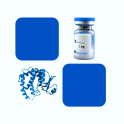
- Remove this product from my favorite's list.
- Add this product to my list of favorites.
Products
Newsletter
 |  |  |  |  |  |

Background
Ephrin-A1 (EFNA1) is also known as EPLG1, LERK1, TNFAIP4, Immediate early response protein B61, which belongs to the ephrin family. EFNA1 contains one ephrin RBD (ephrin receptor-binding) domain. EFNA1 is cell surface GPI-bound ligand for Eph receptors, and is a family of receptor tyrosine kinases which are crucial for migration, repulsion and adhesion during neuronal, vascular and epithelial development. EFNA1 binds promiscuously Eph receptors residing on adjacent cells, leading to contact-dependent bidirectional signaling into neighboring cells. EFNA1 plays an important role in angiogenesis and tumor neovascularization.
Source
Recombinant Human Ephrin-A1, Fc Tag (EF1-H5251) is expressed from human 293 cells (HEK293). It contains AA Asp 19 - Ser 182 (Accession # P20827-1).
Predicted N-terminus: Asp 19
Molecular Characterization
This protein carries a human IgG1 Fc tag at the C-terminus
The protein has a calculated MW of 46.0 kDa. The protein migrates as 53-57 kDa under reducing (R) condition, and 100-115 kDa under non-reducing (NR) condition (SDS-PAGE) due to glycosylation.
Endotoxin
Less than 1.0 EU per μg by the LAL method.
Purity
>95% as determined by SDS-PAGE.
Formulation
Lyophilized from 0.22 μm filtered solution in 50 mM Tris, 100 mM Glycine, pH7.5 with trehalose as protectant.
Reconstitution
See Certificate of Analysis for reconstitution instructions and specific concentrations.
Storage
For long term storage, the product should be stored at lyophilized state at -20°C or lower.
Please avoid repeated freeze-thaw cycles.
This product is stable after storage at:
-20°C to -70°C for 12 months in lyophilized state;
-70°C for 3 months under sterile conditions after reconstitution.
(1) "Gene Signature Associated with Nervous System in an Experimental Radiation- and Estrogen-Induced Breast Cancer Model"
Calaf, Roy, Jara et al
Biomedicines (2023) 11 (12)
(2) "Effectiveness of anti-erythropoietin producing Hepatocellular receptor Type-A2 antibody in pancreatic cancer treatment"
Chang, Tsai, Lin et al
Heliyon (2023) 9 (11), e21774
(3) "Urinary Proteomics for Discovery of Gastric Cancer Biomarkers to Enable Precision Clinical Oncology"
Joshi, Bhat, Bellad et al
OMICS (2023) 27 (8), 361-371
Showing 1-3 of 437 papers.
Follow us